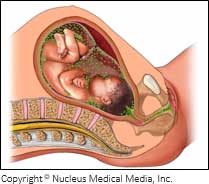
Group B streptococcus (GBS) is a bacterial infection that is commonly found in vaginal and/or rectal areas and which can cause serious illness or death in a newborn. While GBS also can make some adults ill, especially pregnant women and the elderly, it is generally easy to treat. In newborns, though, it can lead to life-threatening infections like sepsis (blood infection) and meningitis (infection of the fluid and lining surrounding the brain). Babies who have had meningitis can develop long-term problems, such as hearing and/or vision loss or learning disabilities, and they can die if the infection is left untreated. You might not have heard of this disease, but if you are pregnant or thinking of getting pregnant, a simple screening test and antibiotic treatment can protect you and your baby.
Newborn babies become infected with GBS in three ways:
- Before birth—Bacteria in the vagina spread up the birth canal into the uterus and infect the amniotic fluid surrounding the baby. The baby becomes infected by inhaling the infected fluid into the lungs.

- During birth—The baby comes in contact with the bacteria in the birth canal.
-
After birth—The baby comes in contact with the bacteria through close physical contact with the mother.
Risk Factors
Factors that may increase a baby's chance of GBS include:
- Mother is GBS positive and does not get antibiotics at least 4 hours before delivery.
- Mother had a previous baby with GBS disease.
- Mother has a urinary tract infection due to GBS.
- Labor or rupture of the membranes before 37 weeks of pregnancy.
- Rupture of the membranes for 18 hours or more before delivery.
- Mother has a fever during labor.
- Frequent vaginal examinations during labor.
- Use of intrauterine fetal monitoring devices.
- Mother has GBS in the vaginal or rectal area, which is determined by a lab test between weeks 35-37 of pregnancy.
Diagnosing and Treating GBS
Screening for GBS bacteria is simple. Testing can be done in an obstetrician’s office and should be performed about one month before the baby is due. The doctor swabs the vagina and rectum and sends this sample to a laboratory to test for GBS. Test results are available in 24-48 hours. Treatment usually does not begin until labor starts.
For the Mother
If you test positive for GBS or are at high risk, your doctor will recommend giving you antibiotics through an IV during labor and delivery. Antibiotics will reduce the risk that your baby will get sick after birth if given at least 4 hours before delivery. Even with screening and antibiotic treatment, some babies can still get GBS. It is generally not recommended that women take antibiotics before labor to prevent GBS unless GBS is identified in the urine. It is not as effective at preventing illness unless it is given after labor has begun.
For the Baby
If the doctor suspects a strep B infection, the newborn might be kept in the hospital a couple of extra days for monitoring, which will include blood and urine tests. A baby diagnosed with GBS will be treated with IV antibiotics for 10 days. If GBS is suspected, antibiotics may be started before a diagnosis is made. Seek medical care right away if your baby has any symptoms of a GBS infection.
Symptoms
Usually, the pregnant woman has no symptoms of Group B streptococcus. In pregnant women, GBS infections can cause infection of the uterine lining or amniotic fluid and can lead to a miscarriage. Two forms of infection occur in newborns, early-onset or late-onset. Early-onset GBS produces illness soon after birth, usually within the first 24-48 hours, but may be up to seven days. Problems may include sepsis, pneumonia, and meningitis. Late-onset GBS usually occurs one week to three months after birth. Medical problems associated with late-onset disease may include sepsis and meningitis. Newborns with GBS diseases can die if they do not receive treatment.
Symptoms for both early and late onset GBS in newborns include:
- Trouble breathing
- Temperature instability (high and/or low)
- Poor feeding
- Irritability
- Lethargy
- Vomiting and diarrhea
If you notice any of these symptoms in your baby, especially if you have tested positive for GBS, call your physician right away. Tara Wickline, FNP, can answer all of your questions regarding Strep B and its symptoms. You can call the practice at (540) 265-1607 or book an appointment online below.